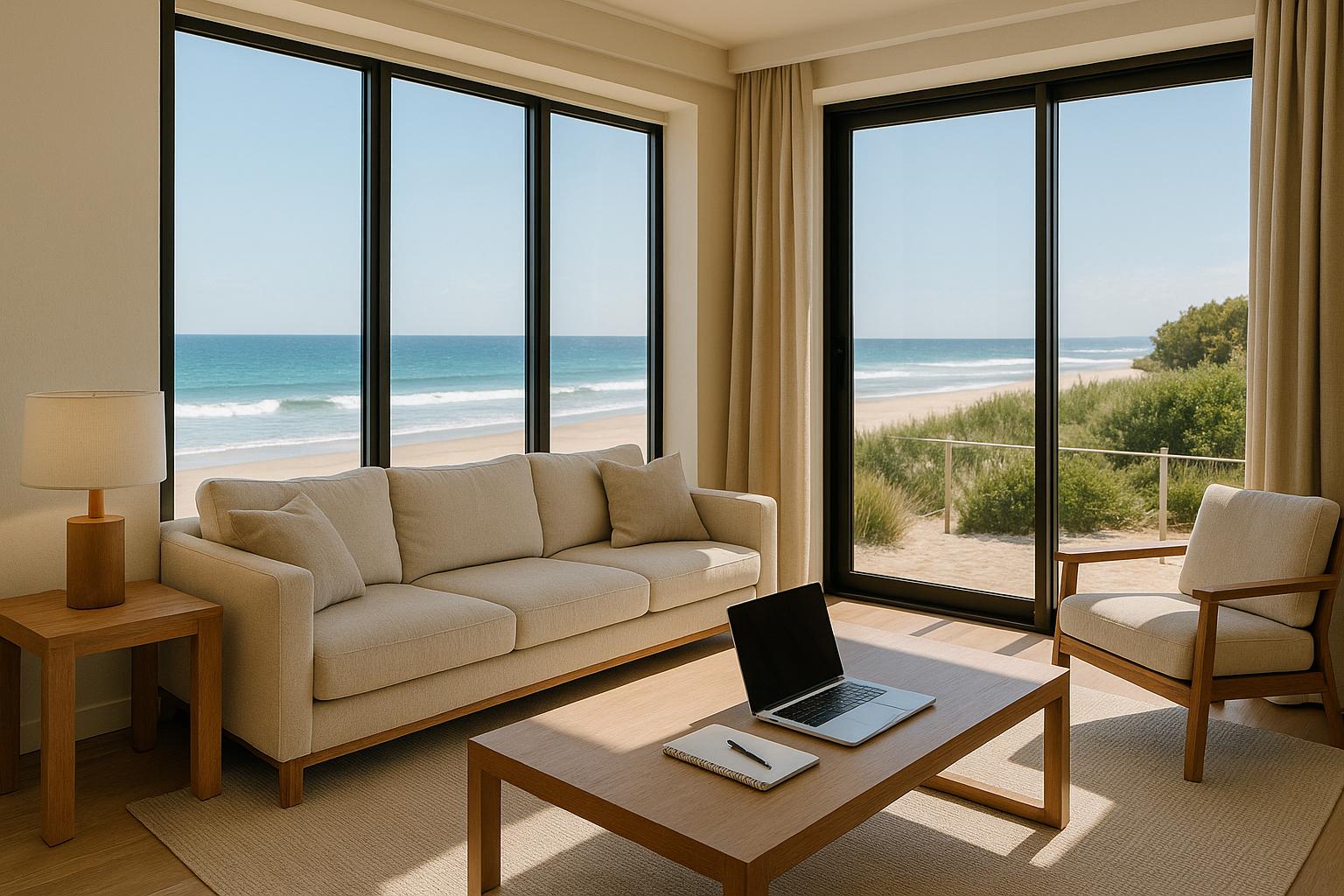
You don’t need to own property to run a successful vacation rental business. Instead, consider these three models:
- Rental Arbitrage: Lease properties long-term and sublet them short-term, profiting from the rent-to-revenue difference.
- Co-Hosting: Manage rentals for property owners, earning 15–30% of the revenue.
- Property Management: Offer full-service management, earning 20–40% of rental income.
These approaches reduce financial risks, require less upfront capital, and allow you to scale quickly. Focus on securing landlord permissions, staying compliant with local laws, and using tools like AI for pricing and operations.
Quick Tip: Start small, research profitable markets, and prioritize guest experience to grow your business efficiently.
Rental Arbitrage Explained | Costs, Profit, & How to Start
3 Business Models for Running Vacation Rentals Without Ownership
Breaking into the vacation rental market doesn’t always mean buying property. There are three distinct business models that let you operate without ownership, each catering to different budgets, risk levels, and goals. Here's a closer look at how they work so you can decide which path suits you best.
Rental Arbitrage: Lease Properties and Sublet Them Short-Term
Rental arbitrage is all about renting a property on a long-term lease and then subletting it as a short-term rental through platforms like Airbnb or VRBO. This approach allows you to start without the heavy financial burden of purchasing property. For instance, if you lease an apartment for $2,000 a month and charge $300 per night to guests, just seven nights of bookings would cover your rent.
Success in rental arbitrage starts with getting the landlord’s explicit permission and thoroughly understanding local short-term rental regulations. Entrepreneurs like Sean Rakidzich have scaled this model significantly, growing from zero to over 100 units. While the model offers flexibility and lower upfront costs, it comes with risks like fluctuating occupancy rates, potential property damage, and landlord-imposed restrictions. For landlords, this setup can mean consistent rental income and help with property upkeep, but it might also lead to increased wear and tear.
Co-Hosting: Manage Other People’s Vacation Rental Listings
Co-hosting is a management-focused model where you oversee vacation rental operations for property owners who lack the time or expertise to do it themselves. Your responsibilities might include updating listings, managing reservations, communicating with guests, and coordinating maintenance.
Some co-hosts charge a flat monthly fee, while others take a percentage of the rental income. To thrive in this role, you’ll need strong organizational and time-management skills, as well as the ability to solve problems quickly. Building a network of dependable service providers - like cleaners and repair specialists - can make a huge difference. It’s also essential to create a detailed co-host agreement that outlines responsibilities and compensation. Using vacation rental management software can help streamline operations and ensure smooth communication with property owners.
Property Management Agreements: Formal Service Contracts
This model involves entering into a legally binding agreement with property owners to provide full-service vacation rental management. As the manager, you’ll handle everything from creating listings and setting prices to managing guest relations, cleaning, and maintenance. Owners typically pay around 10% of the monthly rental income for these services, though fees may be higher for short-term rentals with more intensive demands.
A solid property management agreement should clearly define the scope of services, fee structures, contract duration, and liability terms. Flexibility and clear communication are key to building successful partnerships. As Thibault Mason, Founder of Rental Scale-Up, explains:
"Effective communication is crucial in avoiding pitfalls in vacation rental arrangements."
To succeed, tailor each agreement to the specific needs of the property and owner, conduct regular performance reviews, and ensure contracts comply with local laws by having them reviewed by a legal expert. While this model requires more infrastructure and expertise, it offers significant earning potential and the chance to grow your business. With nearly half of vacation rental hosts managing their properties themselves and 25% of second homes managed as leased accommodations, there’s a sizable market to tap into.
Legal, Regulatory, and Financial Requirements
Running a vacation rental business without owning property requires careful attention to legal, regulatory, and financial details. These steps are essential to protect your business from costly errors and to build a strong foundation for long-term success.
Getting Landlord Permission and Negotiating Lease Terms
Always secure written permission from landlords - verbal agreements can lead to misunderstandings. When presenting your case to landlords, emphasize the benefits, such as consistent rental income and regular property maintenance.
Your lease agreement must explicitly allow short-term subletting. Key terms to negotiate include revenue-sharing arrangements, liability for damages, guest screening procedures, and property access. Some landlords might prefer a higher fixed rent in exchange for permitting short-term rentals, while others may favor a revenue-sharing setup.
Document every agreement in writing, including any changes to standard lease terms. Consider adding clauses to address occupancy limits, noise policies, and how guest complaints will be handled. If you're managing properties for others, ensure co-hosting or property management agreements clearly define responsibilities, insurance requirements, and termination terms.
Once these agreements are in place, review local rental laws to confirm compliance with all applicable regulations.
Following Local Short-Term Rental Laws and Permits
Short-term rental laws differ widely across the U.S., and staying compliant is non-negotiable. The vacation rental industry is projected to generate US$19.77 billion in 2024.
Start by researching zoning laws and permit requirements in your area. Many jurisdictions require a specific short-term rental permit, separate from a general business license. Permit fees can range from US$25 to US$500. For instance, Los Angeles County charges an annual fee of US$914, while Anchorage requires fees between US$200 and US$400 per unit.
Stay informed about regulatory changes, as these rules can evolve quickly. In Anchorage, new laws effective September 15, 2024, mandate licensing for rental spaces, with annual fees ranging from US$200 to US$400 per unit. Similarly, in New York City, regulations prohibiting whole-home rentals for less than 30 days in multi-family buildings caused demand drops of 46.4% in December and 47.1% in January.
Violations can result in steep penalties. For example, Louisville, Kentucky, imposes fines starting at US$125 for a first offense, climbing to US$1,000 for repeat violations. Beyond fines, non-compliance can lead to license suspension, forced closures, or legal action.
To stay ahead, subscribe to local government updates, attend city council meetings, and join vacation rental associations. Keep organized records of all permits, licenses, and communications with authorities.
These legal measures set the stage for solid financial planning.
Budget Planning and Risk Management
Sound financial planning is a cornerstone of any successful vacation rental business. Begin by calculating startup costs, including furnishings, amenities, professional photography, and marketing. Factor in ongoing expenses like rent, utilities, cleaning, maintenance, and subscription tools for property management.
Use realistic projections to estimate profitability. Consider your target nightly rate, expected occupancy, and monthly expenses. Research local market trends to understand seasonal demand and pricing. Be prepared for slower periods as your business establishes itself.
Plan for risks proactively. Low occupancy is a common challenge in rental arbitrage and can impact profitability. Address this risk by investing in marketing, ensuring excellent guest experiences, and developing strategies to navigate off-peak seasons.
Maintain a cash reserve for unexpected expenses like repairs, damages, or vacancies. Experts suggest setting aside three to six months of operating costs. Once your business model is proven, diversifying across multiple properties and locations can help spread risk.
Don’t overlook the importance of specialized short-term rental insurance, as standard policies often exclude guest-related incidents or property damage.
Track your financial performance regularly by comparing actual results to your projections. This will help you identify potential issues early and adjust your strategy or scale your business more effectively.
sbb-itb-08dd11e
Step-by-Step Guide to Launch Your Vacation Rental Business
With your legal groundwork set, you're ready to kick off your vacation rental business. This guide will walk you through identifying lucrative opportunities, building valuable partnerships, and using technology to simplify operations.
Find Profitable Markets and Properties
Market research is your starting point, especially in 2025, where finding a strong gap between rent and revenue is tougher than before. Rental arbitrage only works when the margins make sense, so analyzing market trends is critical.
Start by evaluating STR (short-term rental) premiums, which measure the difference between an Airbnb’s earnings and its leasing costs. A premium above 100% means the rental income is at least double the rent. For instance, in 2024, single-family homes had premiums of 125%, while multifamily properties reached 101%.
"You need a big gap between rent and revenue for rental arbitrage to make sense, and those margins are harder to find in 2025." – Linda Rollins, Senior Research Analyst, AirDNA
Focus on smaller and mid-sized cities, which are experiencing notable growth in short-term rentals. In 2024, small cities and rural areas saw a 16% jump in listings, while mid-sized cities grew by 10.3%. These areas often yield better profits compared to crowded metropolitan markets.
Tools like IdeaFloat's Market Size Assessment can help you analyze demand patterns in potential locations. Look for areas with high occupancy rates, competitive nightly rates, and favorable local rules. For example, Peoria, Illinois, stood out in 2025 with an average for-sale listing price of $202,930 and a gross yield of 15.3%.
Key metrics to track include:
- Cap rates: Aim for 5–10%.
- Occupancy rates: Look for over 60%.
- Average daily rates (ADR): Ensure they align with your profit goals.
Take Logan, Ohio, as an example: it boasted a 12.2% cap rate, 57% occupancy rate, a $343 ADR, and $57,000 in annual revenue potential. These numbers highlight how strategic market selection can drive success.
With the U.S. apartment vacancy rate at 6.9% in Q1 2025, identifying clear market opportunities is essential. Once you’ve pinpointed your target locations, the next step is building strong relationships with property owners.
Build Partnerships with Property Owners
Establishing partnerships with property owners requires understanding their priorities. Some are purely focused on financial returns, while others may have personal or emotional ties to their properties.
"You have to know your owner and what kind of property they have - whether it's an investment or a home they plan to retire in. That determines how you build the relationship and communicate with them." – Heidi Hart, Foothills Property Management
Seek out local property owners open to flexible rental arrangements. Owners of single-family homes or small properties are often more receptive than those managing large multifamily complexes.
When approaching potential partners, transparency is key. Clearly explain your business model and the benefits, such as steady rental income, professional property care, and reduced vacancy periods. Sandie Dodson of Beachcomber Vacation Homes emphasizes the importance of honesty:
"I live by the motto: clear is kind. We're upfront with owners about what they can expect - revenue, busy seasons, and even limitations like Cannon Beach's one‑reservation‑per‑14‑days rule. This honesty helps us build trust from the beginning." – Sandie Dodson, Beachcomber Vacation Homes
Negotiate terms that work for both sides. Flexible cancellation policies, added amenities, or longer-term agreements can make your offer more appealing. Always formalize these arrangements with written contracts detailing responsibilities, insurance needs, maintenance plans, and termination clauses.
Once you’ve secured partnerships, it’s time to optimize operations with AI tools.
Use AI Tools to Streamline Operations
AI has become a game-changer for vacation rental businesses. A whopping 84% of property managers now use AI, and 71% report increased bookings when leveraging AI-enhanced websites.
Start by automating guest communication. AI-powered tools can handle inquiries, streamline responses, and improve response times, which has been shown to boost occupancy rates by 2% and slightly enhance ratings.
Dynamic pricing is another area where AI shines. Tools like IdeaFloat's Pricing Analyzer can help you adjust rates based on market demand, seasonal trends, and competitor activity. This ensures you maximize revenue during peak times while staying competitive during slower periods.
AI can also optimize your property listings by analyzing successful rentals in your area. It identifies key features that attract bookings, helping you refine your approach. Predictive analytics take it a step further by forecasting demand and enabling you to plan ahead. For example, Host & Stay used AI to analyze guest reviews, detect maintenance needs, and automatically schedule cleaning services.
For business planning, IdeaFloat's Business Plan Generator can create professional presentations for property owners and track your performance against goals. This data-driven approach demonstrates your commitment to delivering results.
Properties using AI for upselling have seen revenue increases of up to 15%. Focus on tools that integrate seamlessly with your systems, enhance guest experiences, and reduce manual workload.
How to Maximize Profits and Scale Your Business
Maximizing profits and growing your business go hand in hand. To achieve this, focus on fine-tuning your pricing strategy, elevating guest experiences, and expanding your portfolio with a strategic mindset.
Set Dynamic Pricing Based on Demand
Dynamic pricing can be a game-changer for vacation rental profitability. Instead of sticking to fixed rates, this approach adjusts prices in real time based on market trends, demand patterns, and competitor activity. It's a strategy that aligns perfectly with managing vacation rentals without owning properties. In fact, over 40% of short-term rental professionals now use AI-driven tools to implement dynamic pricing.
These tools factor in seasonality, local events, and competitor pricing to optimize rates. For example, 46% of property managers with larger portfolios have reported increased profits after adopting AI-powered pricing tools. One property manager saw a 35% boost in short-stay rental revenue, while another experienced an impressive 60% increase.
To get started, choose a dynamic pricing tool that integrates with your existing systems. Begin by setting a base price to cover costs and desired profits during slower periods. Then, create pricing rules tailored to local trends. For instance, one manager tripled nightly rates during a local event using this approach.
"The flexibility one gets inside PriceLabs, wherein you can manipulate and create your personalized picture of what you want your prices to be, gives you that edge." – Peter Plourde, Owner, North Conway Property Management
Keep an eye on your bookings and continuously adjust pricing rules to stay competitive. Not only does dynamic pricing maximize revenue, but it also ensures guests see fair, market-driven rates.
While pricing is crucial, delivering a standout guest experience can further strengthen your business.
Improve Guest Experience and Add Revenue Streams
Creating memorable guest experiences is essential for securing repeat bookings and glowing reviews, both of which directly impact your bottom line. But you can go beyond hospitality basics to increase profits per stay by offering additional services.
Professional photos, for instance, can increase engagement by a staggering 352%, leading to more bookings and higher rates. On top of that, offering premium services like airport transfers, grocery pre-stocking, or local tours can significantly boost per-stay revenue.
If you're managing luxury properties, remember that they require more maintenance - around 2–3% of the property's value annually, compared to 1–2% for standard rentals. Automation tools can help maintain consistency across multiple properties, saving hosts managing five or more properties an average of 15–20 hours weekly.
Always track guest feedback to address issues promptly. Positive reviews build trust and attract new guests, setting the stage for long-term growth.
Once your pricing and guest services are optimized, it's time to focus on scaling your business.
Expand to Multiple Properties and New Markets
Expanding your portfolio requires careful planning and data-driven decisions. The goal is to grow profits while spreading risk across different markets and property types.
Start by conducting thorough market research with tools like AirDNA or Mashvisor. These platforms can help you analyze occupancy rates, average daily rates (ADR), and seasonal demand trends. Target emerging destinations with strong growth potential rather than oversaturated markets.
Diversifying your portfolio is another smart move. As Daniel Ramirez from Host Financial explains:
"Investing in different types of properties and in various locations can help mitigate risk and tap into different tourist demographics and seasons. This approach requires thorough market research to identify emerging destinations with high growth potential. Diversification not only spreads out your investment risk but also maximizes revenue potential by appealing to a broader range of guests."
It's worth noting that as your portfolio grows, maintaining personalized attention can become challenging. Data from AirDNA shows that hosts with a single listing average a review score of 4.89, while those managing 100 or more listings often see scores drop to around 4.66.
To manage growth effectively, invest in integrated systems like property management software (PMS), channel managers, and dynamic pricing tools. You might also consider hiring help - property managers typically charge 15–40% of rental income, while virtual assistants cost $15–$25 per hour for administrative tasks. These resources free up your time to focus on strategy rather than day-to-day operations.
Before entering a new market, always research local permits, taxes, and zoning regulations. These rules vary widely and can greatly impact your expansion plans.
Take a gradual approach to scaling. Test one market or property type at a time to refine your systems and minimize risks. Keep a close eye on income and expenses for each property, and don't hesitate to offload underperforming assets through strategies like 1031 exchanges to reinvest in better opportunities. By scaling carefully and staying informed, you can grow your business while maintaining a low-risk model.
Key Steps to Build Your Vacation Rental Business
Starting a vacation rental business without owning property requires a smart approach. Success hinges on detailed market research, forming strong partnerships, and using the right technology to streamline operations.
Begin by conducting in-depth market research. Tools like AirDNA or Mashvisor can help you analyze demand, competition, and rental rates in your target areas. Look at successful Airbnb listings in your chosen market to spot effective strategies and uncover potential gaps you can fill. This step lays the groundwork for your business plan and ensures you're making informed decisions from the start. Once you've got a clear picture of the market, the next step is building partnerships with property owners.
Use your market insights to craft a professional business proposal that highlights the benefits of short-term rentals. Address property owners' concerns upfront and consider offering a profit-sharing model to make the deal appealing. It’s also critical to ensure that leases allow subletting to avoid any legal complications.
Before moving forward, focus on legal compliance and financial planning. Calculate potential earnings by factoring in average nightly rates, occupancy rates, and monthly expenses like furnishing, cleaning, maintenance, and amenities. These figures will help you assess the profitability of each property.
When it’s time to create your listings, make them stand out. Use professional photos to showcase the best features of each property and write engaging descriptions that emphasize unique selling points. Price your rentals competitively, using your market research as a guide.
To stay ahead, consider leveraging AI tools. These can automate guest communications, optimize pricing, and handle routine tasks, giving you a competitive edge. In fact, 66% of property management companies with 50 or more properties already use AI, achieving cost savings and boosting ratings and occupancy rates by up to 13%. As Liam Carolan from Boostly puts it:
"It's time to get out of the mindset that AI is a choice. The real question is how to integrate the technology successfully into our operations."
Once you’ve streamlined your operations with technology, focus on growing gradually. Start with one or two properties to fine-tune your processes before scaling up. Track key metrics like bookings, revenue, and customer satisfaction to measure the success of your strategies. As Kyle Loveland advises, "Focus on what you're good at and double down on your strengths".
The vacation rental industry is full of opportunities for those who think creatively about accessing properties and combine proven methods with modern tools like AI.
FAQs
What legal factors should I consider when starting a vacation rental business without owning property?
When launching a vacation rental business without owning property, following local zoning laws and short-term rental regulations is crucial. These rules can differ significantly depending on the city or state, so it’s important to verify whether short-term rentals are allowed in your chosen area and if you’ll need any specific licenses or permits.
Another key step is securing explicit permission from the property owner or landlord. Many lease agreements strictly forbid subletting or subleasing without prior approval, and ignoring this could lead to legal trouble or even eviction. Lastly, make sure you have the right insurance coverage in place to safeguard against potential risks, such as liabilities or damages that could arise during your business operations.
How can I negotiate lease terms with landlords for a rental arbitrage business?
To negotiate lease terms effectively for rental arbitrage, focus on earning the landlord's trust and demonstrating how your business can be mutually beneficial. Share your plans for managing the property responsibly, including steps like thorough guest screening, regular cleaning, and consistent maintenance. Presenting a well-organized business plan that outlines how you’ll reduce risks and ensure reliable income for the landlord can leave a positive impression.
Make sure to address any concerns about local regulations and legal compliance right from the start. Be ready to answer questions and propose solutions that adhere to local laws. Finally, ensure all agreements are documented in writing to protect both parties and lay the groundwork for a successful working relationship.
What are the best AI tools to optimize pricing and simplify operations for a vacation rental business?
To make your vacation rental business more efficient and profitable, consider leveraging dynamic pricing tools such as PriceLabs. These tools automatically adjust your rental rates based on market trends and demand, helping you stay competitive while maximizing revenue.
For smoother operations, platforms like Guesty or Host Buddy AI can be game-changers. They use AI to automate routine tasks, handle bookings, and improve communication with guests. By saving time and cutting down on operational costs, these tools can help you focus on growing your business while keeping things running seamlessly.
Related Blog Posts
Get the newest tips and tricks of starting your business!


